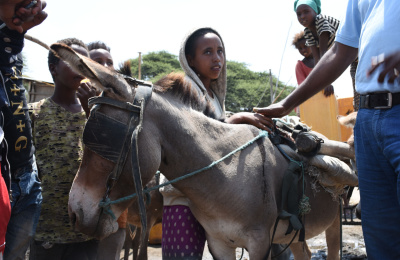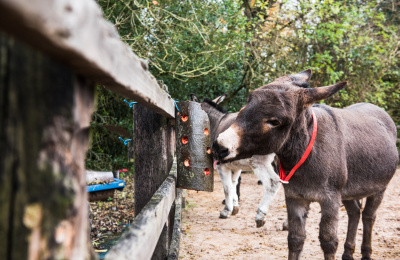In a single day, every donkey, mule, hinny and pony in our care in the UK and Ireland was accounted for thanks to a nationwide effort between staff, volunteers and Donkey Guardians.
Why census?
A nationwide census of thousands of animals is not a task to be taken lightly, yet is hugely important to the wellbeing of the animals in our care.
"A census of any animal population wears many hats," says Animal Management Systems manager Sarah Tulloch.
"It’s first and foremost for each donkey to be accounted for, secondly it’s to match up our data systems and ensure our information is correct, and thirdly it gives the farm staff additional opportunities to lay their hands on the donkeys and check for any ailments."
If this video doesn't show, it may be because your cookie settings need updating. Manage your cookie settings.
The vast majority of our animals live at our farms and sanctuaries based all around the UK and Ireland – from Sidmouth, to Birmingham, to Belfast. Others, however, are more disparately spread around the nation in holding bases or Guardian homes, requiring a real team effort in order to ensure every single donkey in our care is accounted for.
Our travelling welfare advisers were available to reach those donkeys living off the beaten track, while vets and grooms at our bigger farms and sanctuaries were able to implement some time efficient measures in order to see large amounts of donkeys and mules on census day.
A ‘race’ against time
Although the thought of surveying thousands of animals across the country within a day may appear a little daunting, each of our farms benefit from specialist equipment to make the process time efficient and stress-free for the donkeys.
Farms are equipped with a ‘race’ - a fenced area of a barn or enclosure which encourages the donkeys to form a single file line before entering a contained area for checks.
The animals in our care are very familiar with the race process: it is often used to help administer wormers, or when weighing them, and provides a safe environment for both donkey and handler alike.
Once the donkey is within the contained area, they are given a check-over by staff and are scanned for a microchip. If the microchip can be found, it is checked against our paperwork and the donkey can join the rest of their friends.



Just 4.4% of our herd across all sites had a missing microchip. These animals will be re-scanned and supplied with a new chip if one cannot be found.
After a long day of record-taking, chip-scanning and animal checks, our teams were thankful that the mammoth task had gone to plan.
“Once we had finished we were all too glad not to be doing the same process in a zoo,” reflects Sarah. “Stick insects, leaf cutter ants … I think we got off lightly.”
Your support helps us to reach out
Not only to donkeys in the UK - but all over the world.




